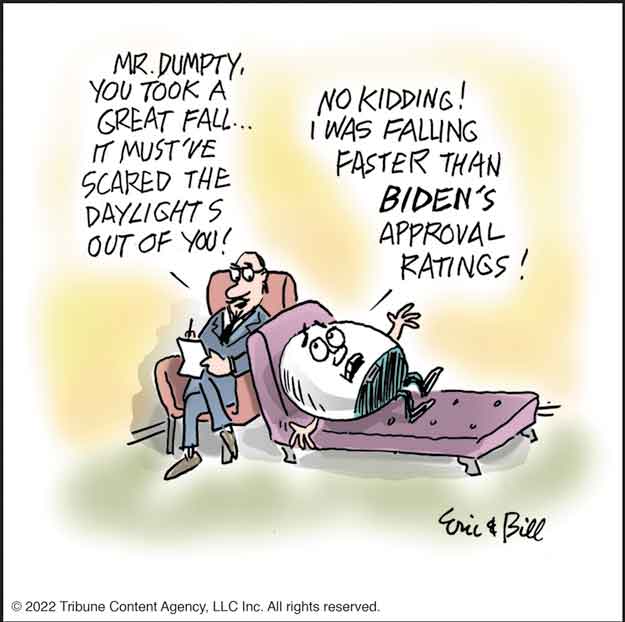
Biden spent most of that recent period as the least popular president of the polling era on a comparative basis. He's now faring somewhat better than Harry Truman did - Biden's at 39% on day 526 of his presidency, compared to Truman's 33% - which might offer some reason for optimism, given that Truman wound up winning re-election. But in the short run, it certainly bodes poorly for Democrats, given that Truman's party was clobbered in November 1946.
As to why Biden is doing so poorly? There are too many potentially relevant variables to be certain of anything. But both historical patterns and the week-to-week fluctuations over the last year suggest some answers. I remain convinced that it's really just two things.
The one that hurt him badly from late last summer through early this year was the continuing spread of the coronavirus, which put everyone in a sour mood that still hasn't lifted. Again, there's no way to prove anything, but the rise of the delta wave followed by the overwhelming omicron wave during the winter corresponded closely with Biden sliding from more than 50% approval down to about 42%.
And then there's inflation. Biden's recent slide corresponds to the major spike in gas prices beginning on Memorial Day weekend. On the pandemic we're mostly guessing; there's no data from a century ago to track the effects of the Spanish Flu on presidential popularity.
But there's plenty of evidence over the years that the economy - and especially inflation and gas prices - has a powerful influence on approval ratings and subsequent elections.
In fact, Truman in 1946 was unpopular mainly because of a postwar surge in prices, and his support increased by 1948 largely because that surge had receded. As political scientist Richard Skinner put it, "The current political environment is very pundit-unfriendly because if you honestly want to explain Dem problems the answer is inflation, inflation, inflation. That makes for a boring column!"
One piece of good news for Biden is that gas prices peaked two weeks ago and have since retreated a bit. One can even imagine an optimistic scenario in which inflation has topped out and gas prices continue descending for a while, while the omicron wave also begins to dissipate.
If that does happen - and assuming that no other major troubles turn up - it's plausible that Biden would begin to regain some more support.
Don't listen to those who say that voters have made up their minds permanently about him. Plenty of presidents have recovered from worse than what Biden is now going through, including Truman, Bill Clinton and Ronald Reagan. Of course, many partisan Republicans never approved of Clinton, and just as many partisan Democrats never approved of Reagan. But both of those presidents became wildly popular at times, and it's certainly possible that Biden could do the same.
All that said, this latest dip suggests something pretty important for the midterms. In early May, when Biden's approval rating was at about 42%, Democrats could still hope that if only he gained a percentage point a month, he would be close to 50% - and might then have a net positive approval rating - by Election Day. Now?
That same one-point-a-month improvement wouldn't even get him to 45% approval. Sure, better is possible, but at this point it would take something more than just a run of relatively normal good news to get him there.
Democrats can still hope that they'll outperform Biden's approval in the midterms. Some polling, at this point, looks better for them than presidential approval alone would predict. Perhaps some combination of favorable news and particular candidates will help them out.
But that's not a bet that many political parties want to make.
(COMMENT, BELOW)
Jonathan Bernstein is a Bloomberg Opinion columnist covering politics and policy. He taught political science at the University of Texas at San Antonio and DePauw University and wrote A Plain Blog About Politics.


 Contact The Editor
Contact The Editor
 Articles By This Author
Articles By This Author